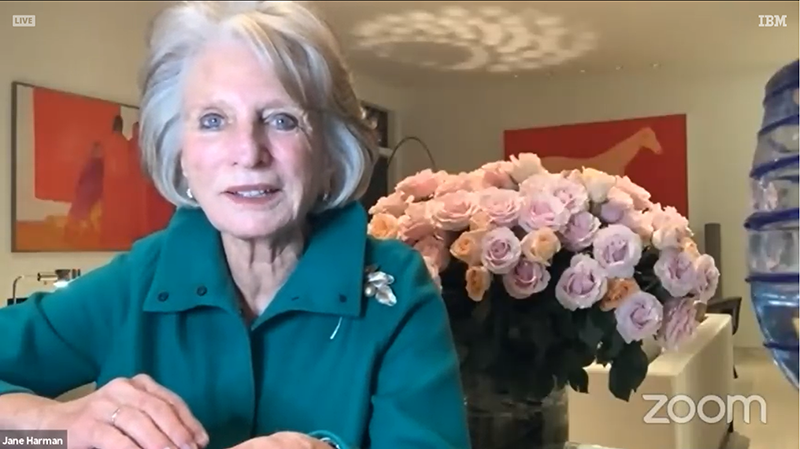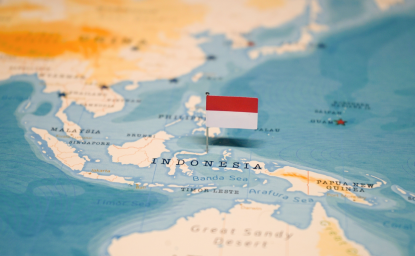North Korea’s growing nuclear and missile arsenal, a rising China, ruptures in regional alliances and a pandemic uncurbed: The challenges facing the United States and South Korea are manifold in 2021 as the Biden Administration enters its first year in office and the Moon Administration approaches its final year in power.
On Wednesday, Feb. 17, 2021, a distinguished panel joined the Hon. Jane Harman, the Wilson Center’s director, president and CEO, to discuss the future of the U.S.-South Korea alliance. This event served as a farewell to Congresswoman Harman, who announced her departure as Wilson Center CEO.
To recognize Congresswoman Harman’s 10-year career at the Wilson Center, which included forging partnerships with the Korea Foundation and Hyundai Motor to form the Hyundai Motor-Korea Foundation Center for Korean History and Public Policy, Harman was joined by former South Korean Ambassador to the United States Ho-Young Ahn, former U.S. Ambassador to South Korea Mark Lippert, and South Korean Congressman Jin Park. Congressman Park served as moderator for this event.
Opening remarks for the event were delivered by Korea Center Director Jean H. Lee, who highlighted Harman’s work at the Wilson Center and on the Korean Peninsula. Lee noted that Harman maintained strong personal and professional connections to South Korea during her tenure, making several high profile visits to Seoul.
Congratulatory remarks were then offered by key partners of the Korea Center: Minjeong Kim of the Korea Foundation and Yong Sohn of Hyundai Motor. Both reflected on Harman’s long term commitment to the Korean Peninsula.
What lies ahead for the Korean Peninsula?
After an introduction of the panelists by Asia Program Director Abraham Denmark, Congressman Park opened up the discussion. While the discussants covered a range of topics, including political instability in the U.S., the rise of China, and the possibilities for establishing new partnerships in Asia as a whole, a key theme was the state of the U.S.-South Korean alliance.
During the last four years, prickly issues such as burden cost-sharing have put pressure on the U.S.-Korean relationship. At the same time, President Joseph “Joe” Biden’s campaign promised to reinvigorate U.S relationships abroad. In an op-ed for Yonhap news, President Biden promised South Koreans a return to “principled diplomacy.”
Congressman Park opened up the discussion by asking Harman and Amb. Lippert to describe the mood in Washington, particularly given the Jan. 6, 2021, Capitol insurrection and subsequent tensions surrounding the presidential election.
Noting the seriousness of the rising threat of “home-grown” terrorism, Harman remarked on the massive challenge it poses for the new administration, not just in terms of using law enforcement to crack down on the resulting violance but also in intervening before groups cause harm. This will be difficult to address in a polarized political climate, she said.
“One of the reasons I left Congress for the Wilson Center,” said Congresswoman Jane Harman, “is because of the partisanship in Congress. I was so tired of this business model, which is: One party is blaming the other party for not solving the problem because if you work together to solve the problem -- whatever the problem is -- then you are ‘bipartisan,’ and that makes you very vulnerable in your next election.”

Harman also reflected on how this relates to the U.S.-South Korea alliance. Partisanship “takes so much energy out of the conversation that the focus we need to have on the Korean Peninsula -- especially on what is going on in North Korea, with the increase in nuclear weapons, long range missiles, harsh rhetoric -- isn’t there.”
Amb. Lippert added, “There are elements in the domestic situation that Congresswoman Harman outlined that you have to keep an eye on because this is a democracy. But having said that, the United States resoundingly elected a president who’s an internationalist.”
Amb. Lippert highlighted the depth of experience of President Biden’s foreign policy team and their commitment to resetting U.S. alliances.
“As this president has made clear, we’re not going to do this alone. It’s going to be partners, friends, and allies -- emphasis on allies, emphasis on (South) Korea -- that really will undergird U.S. foreign policy going forward,” said Amb. Lippert.
Transitioning from the Washington perspective to the South Korean perspective, Congressman Park described his own feelings about the election as a South Korean politician.
“I was personally really relieved to see the overcoming of crisis, political crisis, in the States and the restoration of constitutional democracy despite the violence things happening there,” he said. I think that the Korea-U.S. relationship should move in the direction of a predictable, mutually respectful, and value-driven partnership. Our alliance is based on core values like democracy, free markets, human rights, and rule of law.”
In response to the same question, Amb. Ahn offered his own perspective.
“If there’s one word to describe the reaction in Korea, I think it would be ‘enthusiasm,’” he said.
How this “dream team’s” success should be measured, Amb. Ahn noted, is how they manage the United States’ relationships abroad. On this point, Amb. Ahn was optimistic.
“I’m so glad that President Biden as well as (Secretary of State) Tony Blinken as well as everybody else on the team made it very clear that one key ingredient of the Biden presidency will be strengthening alliances, including the Korea-U.S. alliance,” he said. “I really look forward to welcoming four years or eight years through which the United States is coming back into a leadership role and the Korea-U.S relationship is strengthened. And along the way, we could be putting together meaningful places to address the North Korean nuclear issue.”
More information on the event, including the full video and selected quotes, is available on the event page.
Dong Ho Chung is a recent graduate of Georgetown University, where he earned his M.A. in Security Studies. He received his B.S. in Economics from the George Washington University. He also served in the Republic of Korea Navy as an officer in charge of foreign relations for the South Korean Naval Special Warfare unit. Before joining the Wilson Center, he worked as a fellow at the Global Co Lab Network, managing a project focusing on science diplomacy in engaging North Korea. Dong Ho is a staff intern at the Wilson Center’s Hyundai Motor-Korea Foundation Center for Korean History and Public Policy.
Olivia Grotenhuis is a recent graduate of the University of Virginia, where she earned her B.A. in Foreign Affairs and East Asian Studies with a concentration in Korean language. She is a staff intern at the Wilson Center’s Hyundai Motor-Korea Foundation Center for Korean History and Public Policy.
Authors


Hyundai Motor-Korea Foundation Center for Korean History and Public Policy
The Center for Korean History and Public Policy was established in 2015 with the generous support of the Hyundai Motor Company and the Korea Foundation to provide a coherent, long-term platform for improving historical understanding of Korea and informing the public policy debate on the Korean peninsula in the United States and beyond. Read more


Indo-Pacific Program
The Indo-Pacific Program promotes policy debate and intellectual discussions on US interests in the Asia-Pacific as well as political, economic, security, and social issues relating to the world’s most populous and economically dynamic region. Read more

Explore More
Browse Insights & Analysis
The OSCE is a Good Value for America

Israel Escalates Attacks in Gaza: What’s Next?



